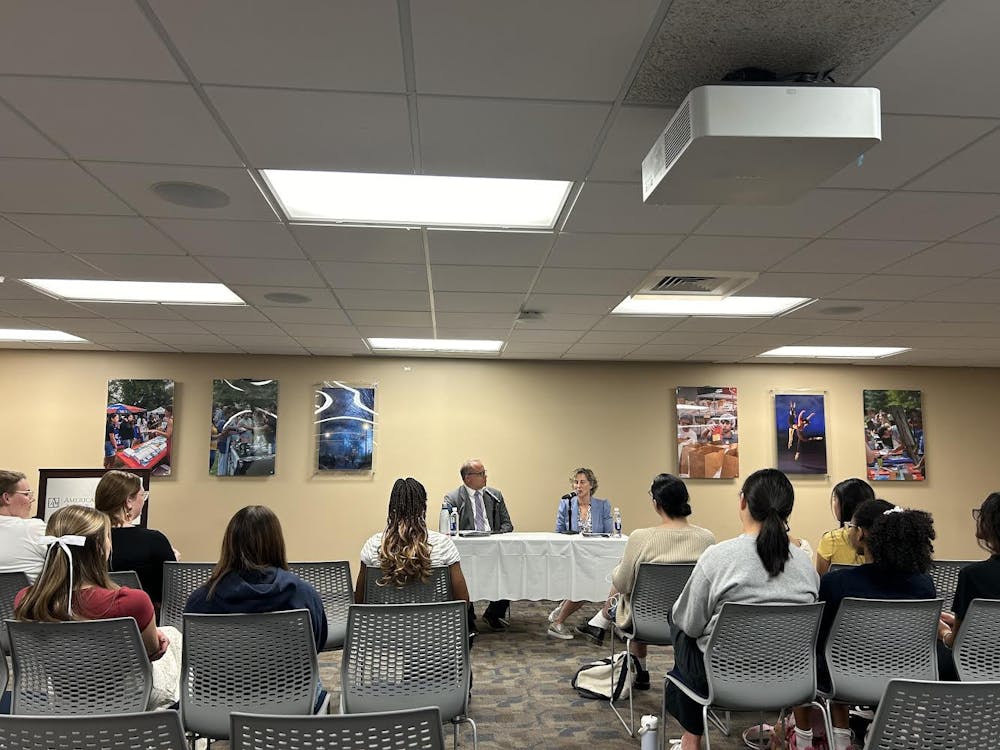Robin Maher, the executive director of the Death Penalty Information Center, spoke at an event on Oct. 22 at American University urging students to use their voting power to change the conversation around the death penalty.
Students for a Just Society and Students for Change welcomed Maher to discuss her recent research paper, “Lethal Election: How the U.S. Electoral Process Increases the Arbitrariness of the Death Penalty.”
Maher, in her conversation with Jason Fabrikant, a Justice, Law and Criminology professor at the University, shared how the Death Penalty Information Center acts as a database to track how the death penalty is being used around the country. Maher said she thinks it is overwhelmingly used in an unfair and “incredibly racist” manner.
“It’s not just a very severe punishment, it’s a deeply flawed practice,” Maher said.
Maher said elected officials play a vital role in every step of the death penalty process; how it gets used, who gets sentenced and executed and when those executions take place. According to Maher, this puts voters in a unique position to elect judges and prosecutors based on how they feel about the death penalty.
“We can say to those people that are running for elected office, this issue matters to us,” Maher said. “Whether you use the death penalty, how you use the death penalty matters to us. If you want my vote, this is what I believe. So you get to decide.”
Julia Landick, president of Students for a Just Society and a senior in the School of Public Affairs, said this need for students to vote and share their concerns with elected officials was the reason for crafting the event.
“We just wanted to provide another platform where people could come and learn more about why their voice is so important,” Landick said. “I think a lot of times young people feel like they can’t really do anything and that’s not the case as we learned tonight.”
Caroline Vuckovich, vice president of Students for a Just Society and a senior in SPA, agreed with Landick and said this event was important for them to organize because they are one of the few criminal justice organizations on campus.
“We certainly feel a responsibility to cover this topic and provide a space for students to discuss it and learn about it,” Vuckovich said.
The nature of these officials being elected can also create problems, Maher warned. She said there are “conflicts of interest” in which elected officials feel pressured by the electorate and their fundraising needs to make decisions that do not always follow the rule of law.
“They’re putting their interests, their personal agenda, ahead of what the law might require or what the facts might demand,” Maher said.
Maher said elected officials are starting to notice a shift in public opinion on the death penalty. In a Gallup poll from October 2023, 53 percent of Americans said they are in favor of the death penalty, which is significantly down from 64 percent of Americans who were in favor only 20 years earlier in 2003.
“The more public opinion changes, and the more people like you voice your opinion and concerns about the death penalty, the more changes we’re going to see in their [elected officials’] attitudes and their behaviors,” Maher said.
This rises from the level of local and state elections to the presidential election as Maher said each of the current presidential candidates has different priorities and stances on this issue. However, Maher said that she does not believe the death penalty is a strictly one-party issue, but instead, there are varying opinions on all sides.
“It’s more a product of religion, of culture, of local practice than it is a party affiliation,” Maher said.
Maher said changing public opinion about how those on death row are treated begins with making space for empathy and humanizing their stories as they have become so “demonized” by society. Maher said this starts with daily actions from everyone and grows bigger as people see others worthy of humanity even in light of what they have done.
“There still is nothing like it. You will never feel more challenged emotionally, intellectually, physically than when you do this work and it is going to break your heart every day,” Maher said. “But it is also, I know, the best thing I can do as a lawyer.”
This article was edited by Payton Anderson, Tyler Davis and Abigail Turner. Copy editing done by Luna Jinks, Sabine Kanter-Huchting, Ariana Kavoossi and Ella Rousseau.





